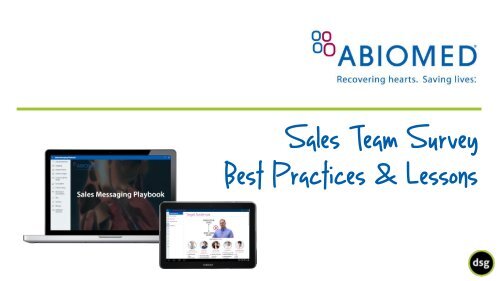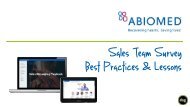Survey Summary of Insights
You also want an ePaper? Increase the reach of your titles
YUMPU automatically turns print PDFs into web optimized ePapers that Google loves.
Sales Team <strong>Survey</strong><br />
Best Practices & Lessons<br />
© 2016 DSG
We asked you<br />
questions about<br />
your sales<br />
conversations…<br />
© 2016 DSG
Let’s take a look at<br />
the lessons we can<br />
apply from the<br />
answers…<br />
© 2016 DSG
Question: Primary roles for meetings<br />
© 2016 DSG<br />
4
Lessons: Primary roles for meetings<br />
Meeting with the Cardiologist is by far the<br />
most beneficial, and we need to know how<br />
to engage them.<br />
Your peers would say that you need to be<br />
skilled as well in leading conversations<br />
with the Administrator and<br />
Intensivist/Hospitalist, then others. Refer<br />
to your vPlaybook for help in identifying<br />
what is important to them.<br />
See the What to Say section <strong>of</strong> the<br />
vPlaybook.<br />
© 2016 DSG
Question: Most Effective Means <strong>of</strong> Securing a Meeting<br />
Top 10 answers from the sales team:<br />
1 Schedule a lunch or dinner<br />
2 Leverage discussion <strong>of</strong> a current case/types <strong>of</strong> patients<br />
3 Position self in high-traffic area appropriate for drawing out details <strong>of</strong> conversation (scheduling<br />
board, copy machine)<br />
4 Ask for time to review new indication/protocols/dossier<br />
5 Talk directly with the MD – then the scheduler<br />
6 Use technology to reach the doc (text, etc.)<br />
7 Ask to discuss the Impella Program<br />
8 Ask to talk about physiology <strong>of</strong> Impella<br />
9 Ask doc to give advice on presentation want to use with less-experienced cardiologist<br />
10 Talk to management/administration to make sure they understand Impella<br />
© 2016 DSG
Lessons: Most Effective Means <strong>of</strong> Securing a Meeting<br />
The best practice answers have some key commonalities:<br />
Be intentional<br />
Plan ahead to identify the right conversation to have with the right person. Another strategy is to<br />
get to know your Clinical Educator and make them a hero by sharing clinical insights. They will<br />
help coach you in turn on their doctors (who is approachable, current method, challenges they<br />
are having, political nuances among group, Key Opinion Leaders, etc.)<br />
Be bold<br />
Give compelling reasons for the meeting and ask the physician personally. Be consultative.<br />
Offer to share “what we’re seeing”.<br />
Be educational<br />
Use the whiteboard to share ideas relevant to specific cases and to the department as a whole.<br />
© 2016 DSG
Question: Outcomes from Whiteboard Conversations<br />
© 2016 DSG<br />
8
Lessons: Outcomes from Whiteboard Conversations<br />
Specific write-in answer to the question…<br />
“All <strong>of</strong> the above have resulted…After open sessions with<br />
staff, they almost force some docs to consider Impella and<br />
state outcome statistics! This is fun to hear!”<br />
Lesson to apply…<br />
Make sure you are using the whiteboard conversation for<br />
both Interventional Cardiologists and others. This strategic<br />
educational tool can help you gain buy in with staff and<br />
administration that is impactful on the physicians.<br />
© 2016 DSG
What other areas do<br />
you need help with<br />
messaging?<br />
© 2016 DSG
Areas In Which Team Wants Help With Quick Tips<br />
1 Understanding how to develop/plan meetings with docs prior to WB<br />
Stay current on what’s going on in the institution--when there is an event or<br />
challenge, that opens the doc and staff to dialogue about a better way.<br />
2 Adapting the message for short time frames<br />
If pinched for time, talk steps 1-2, draw 3-5, then talk 6-7. Ask for follow on<br />
meeting for areas that resonated but were cut short.<br />
3 Improving ability to have reimbursement conversations<br />
Look for an upcoming economic version <strong>of</strong> the whiteboard.<br />
4 Addressing objections<br />
Use the Whiteboard conversation to reveal the barriers to Impella (ex. hemolysis,<br />
groin mgmt, economic)—address these in follow up meetings with compelling<br />
studies<br />
© 2016 DSG
Areas In Which Team Wants Help With Quick Tips<br />
5 Handling physician objections and questions such as surgeons adamant to<br />
use ECMO<br />
Make sure you are familiar with the studies by Chang and Lefort to understand the<br />
complications <strong>of</strong> ECMO.<br />
6 Improving message for the situation and personality<br />
Refer to your vPlaybook for help customizing your message. Learning the<br />
Whiteboard is just the start. The next skill is tailoring it to your audience (how you<br />
start with step 1, the objectives you highlight in step 2, accentuating other parts <strong>of</strong><br />
the Whiteboard you know will resonate based on their challenges).<br />
7 Having physicians find the time to meet<br />
Look for downtime between cases and informally engage with questions (outcome<br />
on previous case or others you know have been a challenge)<br />
© 2016 DSG
Areas In Which Team Wants Help With Quick Tips<br />
8 Initiating a busy physician into conversation<br />
Use the whiteboard for educating the staff in addition to the docs as a means <strong>of</strong><br />
reinforcing messaging to physicians.<br />
9 Identifying the top questions that lead to meetings with physicians that<br />
still use conventional therapies<br />
Consider what you know about your docs, and add insights that address their<br />
preferences and recent case outcomes<br />
10 Getting them to schedule PPCI cases more frequently<br />
Make both the Success Story and the Next Steps very personal—address their<br />
risk or opportunity using an actual case.<br />
© 2016 DSG
Thank You!<br />
© 2016 DSG




